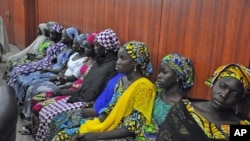Police in Nigeria have banned protests in the capital demanding that the government rescue more than 200 schoolgirls kidnapped by Islamist militants.
Officials say the decision was made because of "security reasons." They say the protests in Abuja could be hijacked by what they call "dangerous elements."
Demonstrators denounced the move and vowed to challenge the ban in court.
Protests in Abuja have been taking place almost daily, part of a campaign to keep attention on the kidnappings and to pressure the government to rescue the girls.
The schoolgirls were kidnapped in mid-April while taking exams at a secondary school in the remote northern village of Chibok, in Borno state.
Borno Governor Kashim Shettima says the 57 girls who escaped captivity will be relocated to schools in Lagos and Abuja, where they will retake the final classes and take another exam.
Militants from the Islamist group Boko Haram claim responsibility for the kidnappings and say they want to exchange the abducted girls for members of their group who are in prison. The group is blamed for thousands of killings during its five-year insurgency to establish an Islamic state.
Nigerian President Goodluck Jonathan and his government are facing sharp criticism both domestically and internationally for their failure to rescue the missing girls.
Several countries, including the United States, are providing Nigeria with help to look for the girls.
Officials say the decision was made because of "security reasons." They say the protests in Abuja could be hijacked by what they call "dangerous elements."
Demonstrators denounced the move and vowed to challenge the ban in court.
Protests in Abuja have been taking place almost daily, part of a campaign to keep attention on the kidnappings and to pressure the government to rescue the girls.
The schoolgirls were kidnapped in mid-April while taking exams at a secondary school in the remote northern village of Chibok, in Borno state.
Borno Governor Kashim Shettima says the 57 girls who escaped captivity will be relocated to schools in Lagos and Abuja, where they will retake the final classes and take another exam.
Militants from the Islamist group Boko Haram claim responsibility for the kidnappings and say they want to exchange the abducted girls for members of their group who are in prison. The group is blamed for thousands of killings during its five-year insurgency to establish an Islamic state.
Nigerian President Goodluck Jonathan and his government are facing sharp criticism both domestically and internationally for their failure to rescue the missing girls.
Several countries, including the United States, are providing Nigeria with help to look for the girls.





